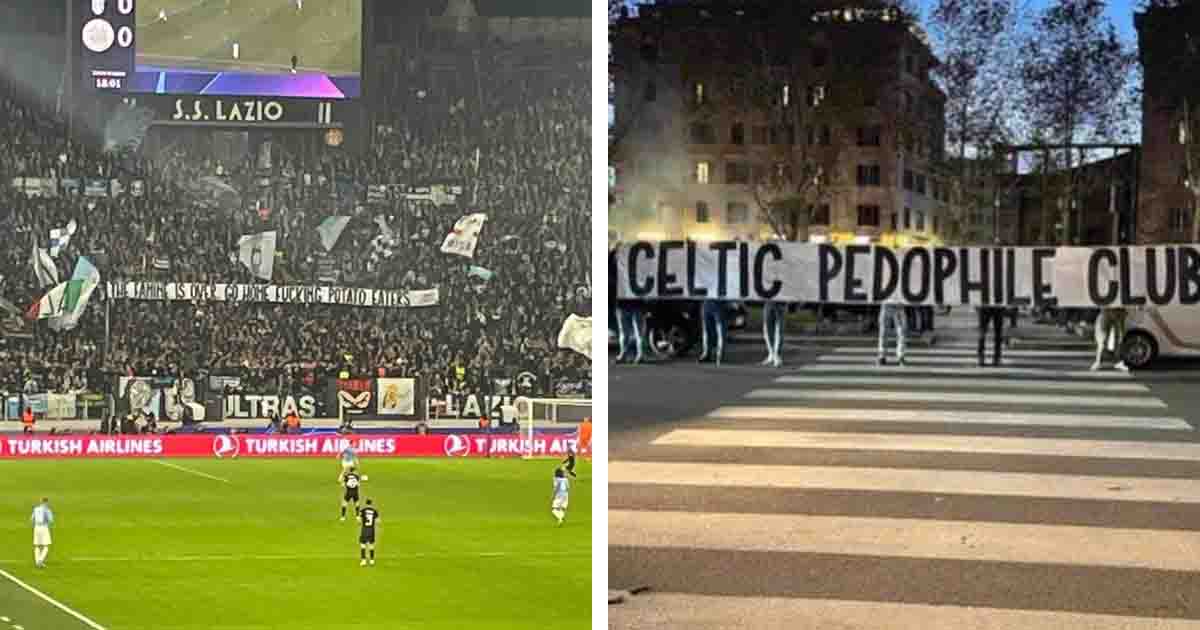Football rivalries are an undeniable aspect of the sport, with some intense clashes taking place among fan bases. When conducted within respectful boundaries, these rivalries add another layer to the game. However, when they extend into derogatory behaviours, it compromises the essence of the game. A recent match between Lazio and Celtic serves as a perfect example.
The two sets of fans have a lot of animosity for each other. This was evident in their recent clash in the UEFA Champions League in Stadio Olimpico. The Italian side have come under a lot of criticism due to their fans exhibiting banners containing derogatory and discriminatory content directed towards the Green Brigade faithful. Controversies sparked due to the display of anti-Irish banners during their match against Celtic.
There has been a bitter feud between these two fan bases for some time now. Around 3,000 or so Hoops supporters travelled to Rome on Tuesday night and were met with a hostile reception. Celtic’s trip to Rome was marred with racist and sectarian abuse from Lazio’s Ultras.
The Italian Ultras made their feelings clear with an offensive flag aimed at Celtic. During the match, the Italian club’s ultras unfurled a banner paraphrasing the infamous Famine Song, which has previously been ruled racist by judges in Scotland. It was also banned by the Scottish police.
“The famine is over. Go home f*cking potato eaters,” the banner read.

That slogan is a riff on a condemned chant used by loyalists and Rangers supporters that taunted their Irish heritage. Contextually, it is a derogatory stereotype associated with the suffering and hardship endured by the Irishmen during the period of the Potato Famine.
Also called the Great Famine, it was one of the biggest tragedies in Irish history during the mid-19th century. The crop disease, potato blight, caused widespread crop failures, leading to famine, disease, mass starvation, and significant emigration from Ireland. The majority of the Irishmen emigrated to Scotland as a result. The reference to “potato eaters” is a derogatory stereotype associated with the tragedy.
Additionally, a series of images of other banners prepared by the Lazio Ultras also appeared on social media. One, referencing the Celtic Boys Club scandal, read “Celtic pedophile club”.

It was in reference to the infamous sexual abuse cases associated with Celtic Football Club’s youth setup. Several former players and individuals who were part of Celtic’s youth system came forward with allegations of being sexually abused during their time at Celtic Boys’ Club. The victims reportedly filed lawsuit cases of sexual harassment against the coaches and staff members affiliated with the club’s youth development program.
Another banner also surfaced on the internet that displayed a banner signed by the same group and held up just outside the ground that included a sectarian slur banned in Scotland. It displayed the term “Fenian“ while referring to Celtic fans.
“Did the Fenian bast*rds take shower today?” It read.
The term “Fenian” historically refers to a member or supporter of an Irish nationalist organization, the Fenian Brotherhood. It was a nationalist movement which aimed for Irish independence from British rule. The term has been used by Lazio Ultras in a derogatory context due to the Celtic’s controversial ties with Irish identity and its fan base’s association with Irish nationalism.

There were early signs of hostility in the match even before the kick-off. Tempers frayed even further and violence escalated when Lazio home fans threw missiles before kick-off. Police and stewards were on the back foot when a firework was launched into the section where the Celtic fans were housed.
Celtic’s fans quickly retaliated by firing a missile straight back towards home fans. They were then divided by a large section of empty seats and stewards but it didn’t stop them from letting rip at each other.
However, this was no surprise. Celtic supporters were always likely to receive a feisty reception in Rome after the Scottish Champions themselves taunted Lazio over their alleged fascist links during the reverse group game fixture at Celtic Park. Celtic are a proudly anti-fascist club while Lazio are basically the complete opposite.
Lazio is infamously associated with far-right ideologies and fascist leanings. Based in Rome, the Lazio Ultras were frequently linked with instances of displaying fascist symbols like the Roman salute and using slogans associated with historical fascist movements.
In contrast, Celtic, located in Glasgow, Scotland, aligns with anti-fascist sentiments. Celtic fans are known for their active involvement in social causes, often displaying banners in support of anti-fascist movements and expressing solidarity with various humanitarian issues such as equality, human rights, and anti-discrimination, notably extending support for causes like Palestine.
Prior to the reverse fixture match at Parkhead, Glasgow, the Green Brigade unveiled a huge banner that featured an image of former Italian fascist leader Benito Mussolini.
The banner displayed Mussolini upside down with the words ”Follow Your Leader”.

The display was further accompanied by the words: ‘Anti Fascist Glasgow Celtic’.
The disrespectful reception resulted in extreme tension between the two clubs’ fans, with Celtic having been fined by UEFA for displaying a ‘provocative message of an offensive nature’.

On Tuesday, Lazio reciprocated that reception. Pictures of the banners, which were seen flying both before and during the game, quickly spread on social media. Football fans have labelled them “shameful” and “disgusting”.
It was reported that the official Lazio account liked the tweets as well. It sparked further controversies before the club rectified their mistake.
While passion for one’s team is natural, it’s essential that these rivalries remain within the boundaries of respect and decency. The inclusion of political agendas in the game is definitely a step in the wrong path. Now, it is up to UEFA to to assess the situation and take proper actions condemning it.
Featured image source: Twitter



